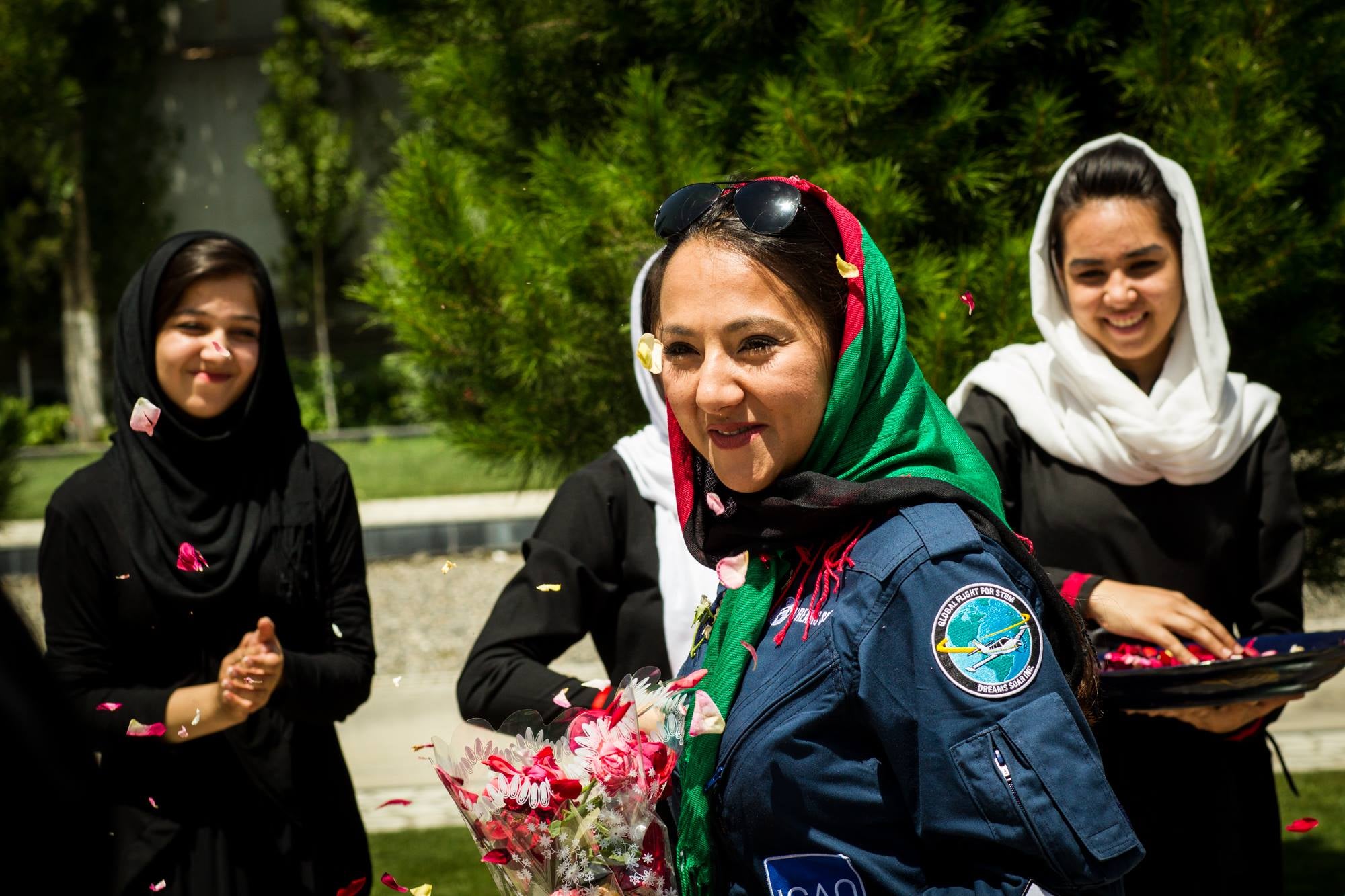Shaista Waiz: The female pilot who's inspiring a generation of Afghan women by flying solo around the world
Shaista Waiz is the first Afghan woman to attempt the feat

Despite the exceptionally warm afternoon, the auditorium in Kabul is packed; young Afghans, mostly girls, fill even the narrow steps by the aisles, craning to see Shaista Waiz: the first female civilian pilot of Afghan origin.
Waiz is the first Afghan woman to attempt to fly solo around the world. She started in Florida on 13 May and has, so far, made it to 11 destinations. She has 24 more stops in store before arriving back in Florida in September on her 2001 Beechcraft Bonanza A36.
Although born in Afghanistan, Waiz is a refugee who escaped the war against the Soviets 30 years ago and was raised in the United States.
“Kabul wasn’t listed on my travel itinerary, but I always planned to come to Afghanistan,” she tells The Independent. “I couldn’t fly the aeroplane here because of the high elevation, but I really wanted to see Afghanistan so I left the plane in Dubai and took a commercial flight here. I had to come one way or another.”
Waiz is something of a celebrity in Afghanistan – perhaps even a heroine, especially for the young girls who aspire to higher goals in a society that continues to remain largely patriarchal and conservative.
Earlier, teenagers jumped up excitedly when they spotted Waiz outside the auditorium. Some brought her flowers; others just wanted to shake her hand and kiss her cheeks. “I’m just like you guys,” she tells the room – first in Pashto, then in Dari, then reiterating it in English. “If I could do it, so can you.”
Indeed, Waiz has much in common with them. Born amid war, like many of her compatriots, her family escaped Afghanistan in the late 1980s. Raised briefly in a refugee camp in Pakistan, she and her family eventually made their way to the US, where they settled in California. For a long time, Waiz believed that her future would be exactly like that of many Afghan women who’ve lived through the war: marriage, and child-rearing. “But I realised it didn’t have to be that way,” she says. “After a while, I stopped listening to people who told me that Afghan women can’t do certain things. There were others who would tell me you’re not smart enough [to be a pilot], but flying was my passion and I fought for it and persisted.” The young girls in the auditorium hang off her every word.
Waiz has since co-founded an organisation that promotes women’s education in science, technology, engineering, and mathematics (STEM), and her solo flight is to raise funds to provide scholarships for underprivileged women in STEM fields. “These subjects are what will help advance Afghanistan, and these careers need both our men and women,” she says. “I know opportunities are small for women in Afghanistan and I hope to change that.”
Waiz met the President of Afghanistan during her Kabul trip, and was honoured with the first civilian pilot certificate given by the government of Afghanistan. Asked about her own heroes, Waiz talks fondly of Jerrie Mock – the first woman to fly solo around the world in 1964. “I was very nervous when I first met her,” she says. “I asked her the first place she went to after her trip, and she told me she went to Afghanistan. I was ecstatic. I took it as a sign.”
And although she’s continuing on her journey – heading to Mumbai, India, after her Kabul stop – she promises to return. “I want to let you all know – the women in the crowd – that I am not doing this flight for fame or money,” she says. “I am being brave for all of you because every day here you are all being brave.” Her words are met with a loud cheer.
While some things have greatly improved in Afghanistan since the US occupation in 2001, the state of women’s rights still leaves a lot to be desired. Access to education for women is limited, and higher education is far more difficult to obtain due to social restrains that dictate a strict role for women in society. Additionally, women make up less than 16 per cent of the Afghan workforce, due to limited opportunities, resources and training.
In an environment where heroes are largely men – not least men associated with the war and ensuing conflict – Waiz provides inspiration to many young Afghans for a hopeful future in uncertain times. “Flying has been my dream and I know how difficult and challenging it is to get it,” she tells the audience. “My goal is to come back to Afghanistan and help you achieve your dreams of flying.”
Leaving the auditorium, one young girl creeps into the room where Waiz is talking with me. The girl sidles up to her and pulls on her sleeve. “After hearing you talk today, I have two heroes and one of them is you. I promise that I will grow up to be a pilot just like you,” she tells her, giving her a hug before slipping away.
Waiz is visibly delighted to have inspired another young woman. “This is what it is about,” she says simply.
Subscribe to Independent Premium to bookmark this article
Want to bookmark your favourite articles and stories to read or reference later? Start your Independent Premium subscription today.

Join our commenting forum
Join thought-provoking conversations, follow other Independent readers and see their replies